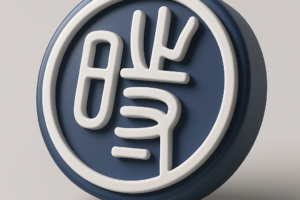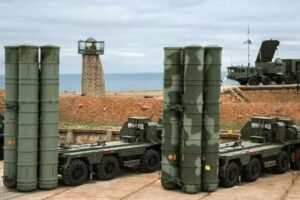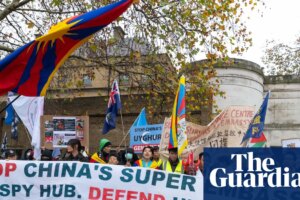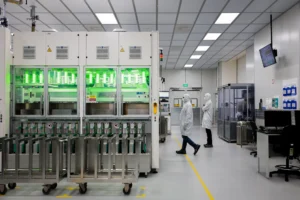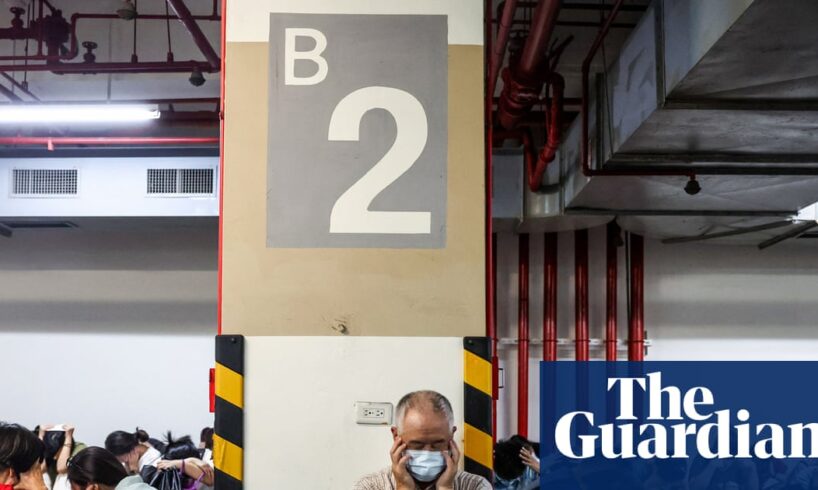
Usually people in Taipei walk quite slowly. Notoriously so. But at 1.27pm on Thursday some were almost sprinting through the busy shopping district of Ximen. They knew they had three minutes to get where they needed to be or they would be stuck in the nearest underground bunker for half an hour.
At 1.30pm exactly, deafening sirens wailed across the city, and a text hit every mobile phone warning: “The enemy has launched a missile attack toward northern Taiwan.”
Shoppers and commuters take shelter in air-raid drill in Taipei – video
Cars and buses pulled over in Ximen, and everyone was ushered into the nearby metro station. Mr Liu, 70, was not quite fast enough to get to his meeting and was pacing the station entrance looking at his watch.
Nevertheless he said he supported the drills because they helped people “feel safe” and taught them what to do if one day the real thing – a Chinese airstrike – hits the city.
The annual drills have become increasingly significant in recent years, as China’s leader, Xi Jinping, forges ahead with his plans to annex Taiwan as Chinese territory, by force if his current strategy of intimidation and coercion fails. The wars in Ukraine and the Middle East also make the drills feel less hypothetical.
This year the drill has been incorporated into much larger civilian urban resilience exercises, in partnership with local governments and private companies such as supermarket chains. They are also being held concurrently with Han Kuang, Taiwan’s annual military exercises, which themselves have doubled in length and ballooned in size.
A participant uses an anti-drone weapon as he takes part in the drill in Taipei. Photograph: I-Hwa Cheng/AFP/Getty Images
The exercises – a key demonstration of Taiwan’s defensive preparations against the threat of Chinese invasion – are normally confined to military bases, offshore islands, or cordoned-off beaches. But this year they have come much closer to the people, with urban warfare simulations in the city streets and on inter-county bridges, repelling assaults on airports and installing newly bought Himars multiple-launch rocket systems on the riverside bike path.
More than 20,000 reservists were involved in the force’s largest ever mobilisation, and about 52,000 of a planned 4 million people had been trained as disaster relief volunteers, the deputy interior minister, Maa Shyh-yuan, said this week. There are also proposed budget measures to better resource local village authorities.
The Guardian has previously reported that the government is exploring plans to have convenience stores serve as wartime hubs, and the Australian Broadcasting Corporation reported this week that taxi drivers were among civilian groups being trained for a wartime volunteer police force.
It is a “big strategic shift”, according to TH Schee, a Taiwan-based civil defence expert. “They used to just say ‘we will defeat the enemies on the beach’.”
Since taking office in May last year, Taiwan’s president, Lai Ching-te, has continued his predecessor’s boosting of the armed forces, sharpened laws and language against Chinese aggression, and prioritised civilian defence and resilience.
“The better prepared Taiwan is for geopolitical shifts and external threats, the safer it will be,” Lai said on Thursday, while inspecting a field hospital simulation at a city high school.
The increased incorporation of civilians has been welcomed by some non-government groups that have been lobbying for it for years.
“It also sends a message to the public: war is not as distant as we might think,” said Ying-Yu Lin, an expert in strategic studies at Tamkang University in Taiwan.
A simulation of a rescue operation in Taipei. Photograph: Annabelle Chih/Getty Images
There are still some concerns. It is thought the estimated 100,000 air raid shelters marked on public safety maps and apps include all known underground spaces such as car parks or basements, which do not necessarily have adequate ventilation or power supply.
And some feel there is not a lot of instruction for people beyond telling them to get underground.
“We should be learning this from a young age,” said Mr Chen, 55, at Taipei main station’s shelter. “Like, how to protect yourself on the spot, or how people are supposed to maintain order inside buildings. But none of that was happening today.”
China’s ruling Communist party is obviously watching. It has labelled the drills “futile” provocations, and has increased the already elevated number of warplane and ship incursions into Taiwan’s air defence zone.
In the Ximen station, Mr Chen, an elderly resident of a neighbouring county, said the Taiwan government was doing a good job and he was glad to practise the air raid drills, but feared “Mr Xi Jinping will not be happy”.
At the high school, Lai said the exercises “were not a provocation”. “In the face of military and political pressure from major powers, preparation is our only option.”
